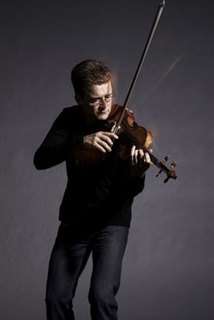|
Back
Concert Congeniality New York
Zankel Hall, Carnegie Hall
02/27/2010 -
Franz Schubert: Piano Trio in B-flat Major, D. 898
Antonin Dvorák: Piano Trio in F Minor, Op. 65
Lars Vogt (Piano), Christian Tetzlaff (Violin), Tanja Tetzlaff (Cello)

C. Tetzlaff (© Alexandra Vosding)
Leipzig’s orchestra was the favorite of Mendelssohn and Schumann, and they were playing in Carnegie Hall’s Isaac Stern Auditorium last night. But Christian Tetzlaff and Lars Vogt are favorites of this century, and they were playing next door in Zankel Auditorium. So the chamber music was the very difficult decision to make.
Besides that, Tetzlaff and Tanja Tetzlaff are part of that very distinguished brother-sister team which, over the centuries, has included Wolfgang-and-Nanerl, Felix-and-Fanny, Yehudi-and-Hepzibah, as well as Warren Beatty and Shirley MacLaine. Quite a pantheon in which to venture.
But cellist Tanja Tetzlaff hardly needed her eminent brother to join the ranks of fine contemporary cellists. She has won practically every cello prize in the book, played solos with nearly every European and Austrlian orchestra, and of course has appeared with the most notable chamber musicians, including her brother.
The last time the two were together in New York was with the Tetzlaff String Quartet, and their performance of Berg, Sibelius and Mozart was very appealing. Both of them are supple instrumentalists. Mr. Tetzlaff has a clean sound, with a disciplined passion when most needed. Ms. Tetzlaff is a very strong cellist indeed, but, as a longtime chamber player, she was part of the organic whole
For this concert, Lars Vogt joined them for two 19th Century pieces, and the three participated in a most vehement chamber “conversation.”
Both the Schubert and Dvorák trios begin with strong statements, and continue on with high Romantic inspiration. Schubert’s B-flat Trio is a buoyant work, and the pace of each movement was judged right. Too often the Andante is performed with a slow weighty texture. But Schubert was simply playing a lovely song, and it was shaped with classical finesse. Both the scherzo and finale was toe–tappingly light as well.
The Dvorák presents problems for any trio. The first and third movements are very Brahmsian (albeit with little Czech harmonies). The second movement, my own favorite, dances through to a trio where Ms. Tetzlaff was particularly effective in the high treble part. (Nor did this ensemble ever forget that Dvorák wrote “grazioso” by the andante.) The finale is one of Dvorák’s great movements, but is mighty tricky. The furiant main theme tricks one into thinking it’s an erratic Bartókian rhythm. It isn’t, but the three instruments must pretend it’s a country dance. Yet as it moves on, this trio slips imperceptibly into a nostalgia, and a deep deep sadness, the last four brusque chords notwithstanding.
The three players performed both works with a fluidity and congeniality which had to have come from their oneness of generation, background and innate artistry.
Harry Rolnick
|